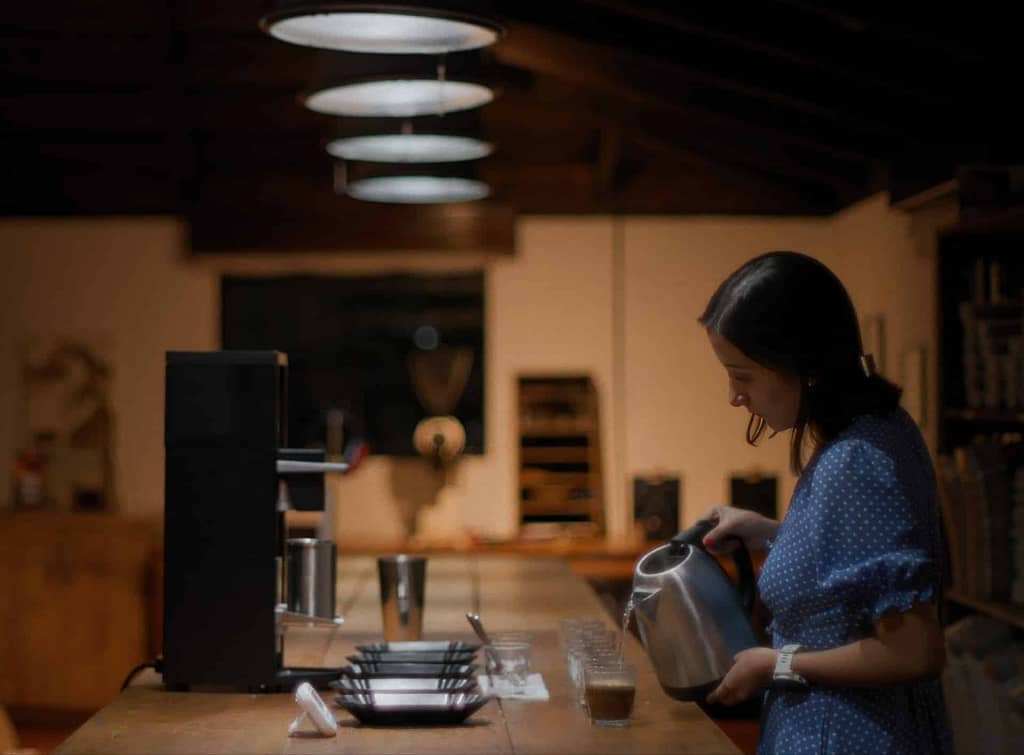[[{“value”:”

Fifth-generation coffee farmer Luisa Rodriguez on being the first woman to take over her family’s farm and being a driving force in Guatemala’s vibrant specialty coffee scene.
Coffee farmer, roaster, café owner, chemical engineer, lecturer, Q Grader, quality control manager, yoga instructor: Luisa Rodriguez wears many hats as the head of Finca Sacramento in Santa Rosa and Café Sacramento in Guatemala City. At just 33, the coffee science and economics graduate is a driving force of Guatemala’s specialty coffee industry.
If Rodriguez had been born in a different decade, however, things could have been very different. Her ancestors planted the first coffee trees in the country’s Huehuetenango region in the 19th century and since then five generations have dedicated their lives to growing coffee. A remarkable number of descendants now work in the industry and they like to say that “coffee runs in their blood”. Yet, when Rodriguez took over Finca Sacramento in Santa Rosa, she was the first female in the family to do so.
“Traditionally, women in Guatemalan coffee families have stayed at home so the men in my family took over the farms. However, that traditional culture is starting to change. There is a growing group of women in the industry and we now have things such as the Women in Coffee Association,” she says.
Rodriguez spent much of her childhood on coffee farms and many of her early memories are of playing in the drying yards with her brothers. She says that growing up as part of a coffee family inspired her to learn more about the industry and pursue it as a career. Eager to innovate, she studied chemical engineering in Guatemala and then a Masters in coffee economics and science at the Università del Caffè in Trieste, Italy.
This formal knowledge of the science of coffee proved hugely beneficial when she returned to Guatemala to take over Finca Sacramento.
“I originally wanted to study agricultural engineering, but my dad thought it was too masculine and there would only be men on the course. Instead, I chose chemical engineering and it was hugely beneficial in helping me understand the chemical elements of growing coffee,” says Rodriguez.
“Everything from processing to roasting and brewing involves chemistry. My background means I’ve been able to run experiments on different methods to improve the quality of the coffee we grow, roast, and serve.”
As part of her mission to advance quality and celebrate specialty beans, Rodriguez established Café Sacramento to share the high-scoring single-origin coffees her team were growing and roasting. The venue is a pillar of the city’s growing specialty scene, for which interest is blossoming.
“When you speak to people about specialty coffee now, they show a lot of interest. In the area of the city we’re in, there’s a growing appreciation of drinks and foods. There’s a great community of people creating artisan beers, natural wines, and gourmet food products,” she says.

Knowledge sharing also forms a crucial part of the venue, where Rodriguez holds regular workshops and courses on coffee preparation. She is also a Professor at the Universidad del Istmo in Fraijanes, where she shares her passion for coffee with hospitality undergraduates.
One thing she tells all her students is the importance of choosing the right equipment.
“When I teach someone how to make the perfect cup of coffee, I need to have the best tools. It’s the same at the café, where I aim to show people how good specialty coffee can be. To do that, the equipment must perform every time,” Rodriguez says.
At both her café and roastery, she uses the Ditting 807 Filter professional grinder, which she says best suits her focus on serving hand-brew filter coffee.
“One thing I learned from my father was that he always surrounded himself with the best people and the best tools – that’s why I chose Ditting,” she says.
“It’s a very traditional brand that’s part of the Hemro Group, so its grinders are known for their quality. I like the 807 because it’s extremely precise and delivers a complex, sweet cup of coffee. I host a lot of cupping sessions at the roastery, so this precision is very important.”
Rodriguez also highlights the consistency of the grinder, which she says is essential for a specialty coffee shop such as hers.
“If a grinder isn’t consistent, you will get over and under extraction instead of a consistently good cup. You may think that most customers won’t tell the difference, but coffee drinkers are becoming more knowledgeable and there are some very particular people out there who can pick up these subtle discrepancies,” she says.
At the roastery, a Ditting 807 is also used to grind beans for pre-ground retail bags. With customers across the country, the quantity of coffee being processed each week requires a robust machine that can handle high volumes and workloads.
“We don’t just supply coffee to our own café but businesses right across Guatemala, so we have a high volume of beans passing through our roastery. The 807 is brilliant at keeping pace with demand and hasn’t let me down,” she says.
“I know I can rely on the grinder for all areas of my business. It feels like a piece of equipment that will stand the test of time and can be passed down generations.”
With such a rich family history in coffee farming, Rodriguez hopes the Ditting grinders will continue to be passed on to the next generation.
“We are a coffee family, a legacy of work. As a little girl, our farm was my world. As a woman, I want to bring that feeling to everyone that tries our coffee.”
For more information, visit ditting.com
This article was first published in the November/December 2024 edition of Global Coffee Report. Read more HERE.
The post Fifth-gen coffee farmer Luisa Rodriguez on the Ditting 807 appeared first on Global Coffee Report.
“}]]


